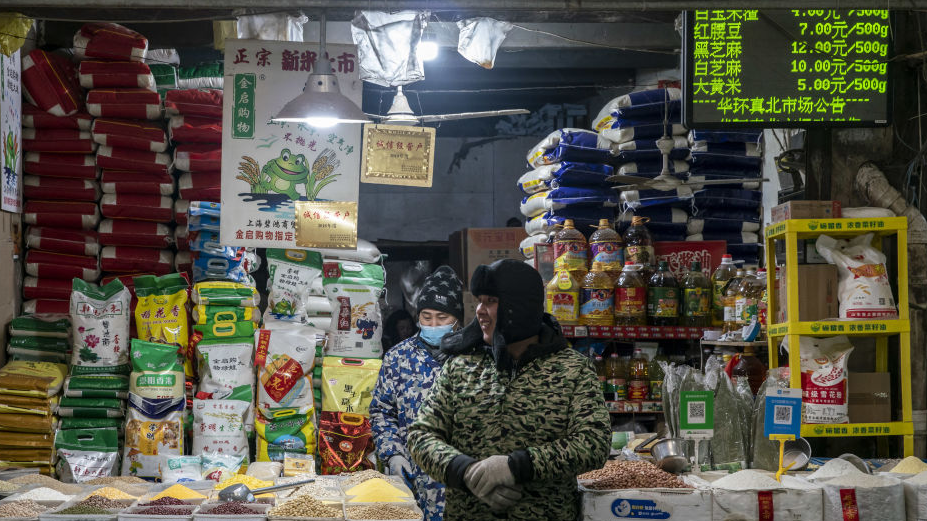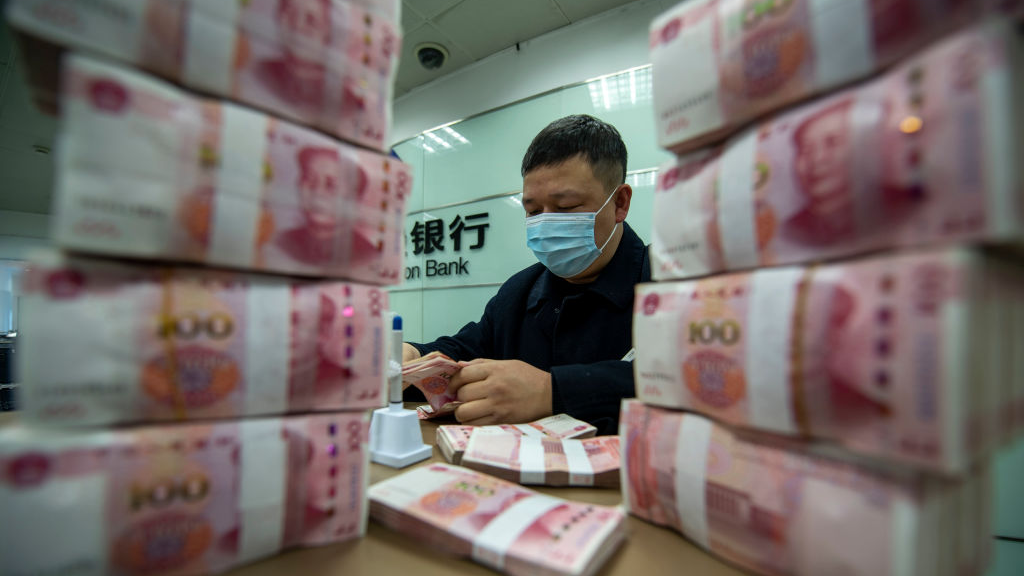
A grain store at a wet market in Shanghai, China, January 8, 2021. /Getty
A grain store at a wet market in Shanghai, China, January 8, 2021. /Getty
Editor's note: Matteo Giovannini is a finance professional at the Industrial and Commercial Bank of China in Beijing and a member of the China Task Force at the Italian Ministry of Economic Development. The article reflects the author's views, and not necessarily those of CGTN.
If there is something positive in the outbreak of the coronavirus pandemic, it is probably the golden opportunity for countries to make their economies more resilient and work on long-term economic reforms that are going to drastically transform the domestic business environment.
In this context, also considering a not optimistic global economic outlook, China has matured an increased level of awareness on the strategic importance of rebalancing it historic dependence on international trade with the increased necessity of relying on an efficient domestic market.
On January 31, the General Office of the Communist Party of China (CPC) Central Committee along with China's State Council made public an action plan that through 51 measures aims at establishing a high-standard market system during the next five years, corresponding to the duration of the 14th Five-Year Plan.
The ambitious plan enlists a series of important interventions that in some cases have been waited for a long time and are expected to have a positive influence on both business environment and quality of market participants.
In order to establish a high-standard market system, that is eventually going to become a driving force for high-quality economic development, the State Council has stressed the importance of introducing solid and trustable property rights protection.
This is, in my view, one of the most fundamental pillars of economic activity since it is aimed at the preservation of companies' investments, innovations and know-how, as a lack of adequate protection of intellectual property could lead companies to lose the incentive to commit capitals or to enter a domestic market that is unable to adequately safeguard legal ownership.
Another important factor that makes a market worthy to be labelled high standard is the creation of an efficient system of allocation of factors of production by removing all those economic and legal barriers that prevent the normal circulation of goods and services.

A bank officer counts RMB cash deposited by a customer at a bank in Nantong, east China's Jiangsu Province, February 1, 2021. /Getty
A bank officer counts RMB cash deposited by a customer at a bank in Nantong, east China's Jiangsu Province, February 1, 2021. /Getty
Getting rid of obstacles with the introduction of ad-hoc policies, the country's top leadership would unleash the Chinese market's full potential, leveraging huge economies of scale and integrating the competitive advantage of each city cluster, thereby ensuring the entire nation's economic development.
In this regard, the State Council has clearly demonstrated through its action plan that market distortions caused by inefficient allocation of resources and an asymmetric distribution of information are not tolerated anymore for an economy that aspires to become self-reliant.
In addition, a relevant aspect of the action plan presented on Sunday reflects the firm intention of the Chinese authorities to keep enforcing laws on anti-monopoly and anti-unfair competition. It is aimed at reducing the unjustified privileges big companies have accumulated in certain sectors due to a lack of legal framework that could have prevented them from getting full control of the supply chain and from raising the market access threshold for competitors.
Through a well-defined regulation, the State Council basically aims at incentivizing wider participation, particularly of small- and medium-sized enterprises, with the final goal of giving shape to a market characterized by fair competition where the winner is the end consumer who can enjoy better quality and service for a better price.
Widening participation in the Chinese market also means a simultaneous reduction of restrictions to market access to foreign capital through the removal of limit to ownership, particularly in the financial sector and generally in the whole service industry, by shrinking the negative list for foreign investment.
Thanks to the opening-up policy, China's market will grow in terms of attractiveness and the increased participation of direct investments by foreign firms, where China is already a world leader after having overtaken the U.S. in 2020, is going to provide the country with an inflow of capital, technology and know-how.
The oversight mechanism of the high-standard market system is going to be strategically important in order to guarantee an adequate level of monitoring of internal and external risks and establish an efficient mechanism of intervention to prevent market failures.
In this sense, the role of the government as a supervisor and guarantor of market order at a time of historical change for the Chinese economy becomes an essential element for the creation of a business environment that meets widely accepted international standards and offers a non-discriminatory treatment to domestic and foreign companies.
All in all, the State Council action plan is going to radically transform China in the next five years into a more open, market-oriented, innovative and friendly business environment, matching the country's aspiration to become the major reference market for international investors.
(If you want to contribute and have specific expertise, please contact us at opinions@cgtn.com.)

